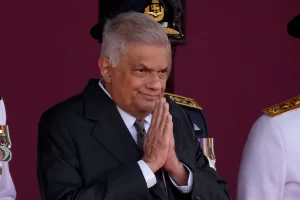Economic reforms and political change the stakes of Sri Lanka’s upcoming presidential election

Sri Lanka is preparing for a key presidential election scheduled for September 17–October 16, 2024. This election comes at a difficult time for the country, which is still dealing with severe economic challenges and the effects of widespread protests that led to the ouster of former President Gotabaya Rajapaksa.
The current interim president, Ranil Wickremesinghe, and former minister Dullas Alahapperuma are the leading contestants in this election. Wickremesinghe, who has served as prime minister several times, is regarded as a seasoned politician with the support of a faction of the ruling party. However, his relationship with the Rajapaksa family and his management of the economic crisis have made him unpopular among many activists.
Alahapperuma, on the other side, has the support of a breakaway group of the ruling coalition as well as the main opposition. Protesters consider him a more palatable choice, and he has underlined the importance of political stability and economic recovery. This election is critical because it will choose the leader who will shepherd Sri Lanka through its present economic changes and address the public’s issues about governance and economic management.
Dissanayake, on the other hand, has acquired tremendous popularity as a change advocate. Early surveys show him ahead with 46% of the vote, followed by Sajith Premadasa at 29% and Wickremesinghe at 17%. This shift in voter opinion reflects broad unhappiness with the existing administration and a desire for fresh leadership to address the country’s economic issues.
Sri Lanka’s economic crisis, defined by severe debt, inflation, and shortages of critical items, has been a major concern for voters. The present administration has adopted a number of economic changes, notably those backed by the International Monetary Fund. While some believe these reforms are vital for long-term stability, they have also been condemned for their impact on the public, resulting in widespread dissatisfaction. Furthermore, the election will test Sri Lanka’s democratic systems. Previous postponements of municipal elections have generated worries about the government’s commitment to democracy, and securing a fair and timely presidential election is critical for sustaining public trust in the political system.

